Gregory A. Fournier's Blog, page 44
July 14, 2013
New Investigative Discovery Channel John Norman Collins Documentary - Fall 2013
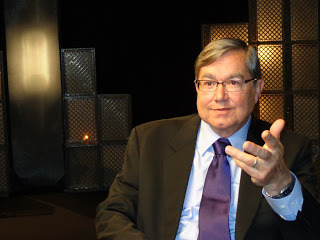 Last April, I was interviewed for an Investigative Discovery Channel program on John Norman Collins and the coed killings of 1967-1969 in Ypsilanti and Ann Arbor, Michigan.
Last April, I was interviewed for an Investigative Discovery Channel program on John Norman Collins and the coed killings of 1967-1969 in Ypsilanti and Ann Arbor, Michigan. Other people appearing on the program will be Katherine Ramsland, forensic psychologist and syndicated contributor to Psychology Today; former Washtenaw County Sheriff Douglas Harvey; and Eastern Michigan University Patrolman Larry Mathewson, credited with breaking open the Karen Sue Beineman case.
In addition to interviews, the program will include re-enactments and scripted elements. It should air sometime this autumn, the date to be arranged. Investigation Discovery true crime series seeks local footage from the 1960sBy Jenn McKee Entertainment Reporter
2 Comments
Share on facebook Share on twitter Share on email Share on print More Sharing Services 1 Posted on Wed, May 1, 2013 : 10:47 a.m.
The production team behind a six part true crime anthology series, “The Bad Old Days” - slated to air on Investigation Discovery in the fall of 2013 - are seeking archival footage and home movies shot in the Ann Arbor/Ypsilanti area in the 1960s.
 The reason? The series, which details real-life murder cases of the 1950s and ‘60s, will in one episode highlight the "Michigan Murders" (’67-’69), wherein local women were terrorized, and the police rooted out one of the nation’s first nationally known serial killers,
John Norman Collins
.
The reason? The series, which details real-life murder cases of the 1950s and ‘60s, will in one episode highlight the "Michigan Murders" (’67-’69), wherein local women were terrorized, and the police rooted out one of the nation’s first nationally known serial killers,
John Norman Collins
.The series’ format combines interviews, scripted scenes and archival footage.
“Our creative team wants to strive for an authentic and intimate look at the time period and of Ann Arbor and Ypsilanti,” series associate producer Rebecca Morton said in an email. “We would like to weave this material into the scripted scenes.
Those with archives or footage to share should contact Morton at rmorton@xconproductions.com.
Tags: TV
2 Comments
Share on facebook Share on twitter Share on email Share on print More Sharing Services 1
 Jenn McKee is an entertainment reporter for AnnArbor.com. Reach her at jennmckee@annarbor.com or 734-623-2546, and follow her on Twitter @jennmckee.
Jenn McKee is an entertainment reporter for AnnArbor.com. Reach her at jennmckee@annarbor.com or 734-623-2546, and follow her on Twitter @jennmckee.
Published on July 14, 2013 00:00
July 10, 2013
My Lost Hollywood Interview
 Over two years ago, I did an interview in Los Angeles at a Hollywood hotel. It was the first time I was asked to do a video interview, and I was excited about it.
Over two years ago, I did an interview in Los Angeles at a Hollywood hotel. It was the first time I was asked to do a video interview, and I was excited about it.I drove up from San Diego and somehow managed to get a great parking space in back of the place. I cinched up my tie and looked for my contact person in the lobby.
She took several of us up to a hotel suite set up as a makeshift studio. One part of of the suite was set up with the camera man and the interviewer; the other part was set up as a waiting area (green room) with snacks and drinks and a half dozen authors.
One of the authors who was also a booking agent was holding court when I arrived. Her project was about Spiritual Cleansing or something like that. She sucked all of the oxygen out of the room until it was time for her interview.
Then there was the math professor from Cal Poly who was promoting a college textbook he had written. He launched into a discussion of chaos theory.
One by one, the others did their interviews in the other room and were led out by that exit. Finally, it was just me and a solidly-built, blonde, thirty-something woman waiting for our turn.
"Who are you? She asked me.
"Oh, I'm Joe Nobody."
She laughed. "Yeah, I know what you mean. What's your book about?"
I gave her the Reader's Digest version of my novel, Zug Island: A Detroit Riot Novel, and my business card.
"Tell me about your book," I said.
"It's about my experiences in ladies' roller derby."
"Fascinating."
 That helped explain her general muscle tone and solid build. She went on to say that she appeared in the feature film, Whip It, with Ellen Page, Kristen Wiig, and Drew Barrymore.
That helped explain her general muscle tone and solid build. She went on to say that she appeared in the feature film, Whip It, with Ellen Page, Kristen Wiig, and Drew Barrymore. Now it was her turn to leave and be interviewed. I was alone.
Finally! Mine must have been the last shoot of the day. I settled into the chair and prepared to talk about my novel when the interviewer asked me about converting a novel into a stage play.
What? He was either tired, unprepared, or had me mixed up with someone else. Anyway, I made the best of it. "That's show business," I thought.
I left feeling like I had wasted my time. When the producers didn't get back with me, I felt that the interview had gone badly, so I didn't follow up. Then today, it appeared in my gmail with an apology for letting it slip through the cracks. For what it's worth, here it is:
http://www.youtube.com/watch?v=e7rZBXZly8A
Published on July 10, 2013 00:00
July 5, 2013
Language in Crisis?
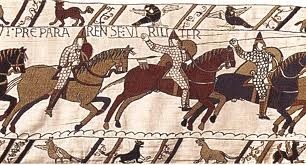 Small segment of Bayeux Tapestry showing Norman French preparing to fight the Anglo-Saxon defenders of the realm.One of the enduring strengths of the English language is its ability to adapt itself to new language environments. The language was wrought on the sharp edge of a Norman sword and the fine point of a French arrow in 1066 AD, when King Harold was cut down by William the Conqueror's men.
Small segment of Bayeux Tapestry showing Norman French preparing to fight the Anglo-Saxon defenders of the realm.One of the enduring strengths of the English language is its ability to adapt itself to new language environments. The language was wrought on the sharp edge of a Norman sword and the fine point of a French arrow in 1066 AD, when King Harold was cut down by William the Conqueror's men.Anglo-Saxon, the language of the vanquished and rural working class, and French, the language of the victors and the ruling class, existed side-by-side until the Norman lads started to intermarry with Anglo-Saxon girls. It could be said that in the beds of merry old England, the English language was born.
 Ancient Anglo-Saxon Epic Eventually, four hundred years or so later, English evolved into a word order language with a simple Germanic syntax and a greatly enriched Latin based vocabulary. This mongrel language was destined to dominate the complicated inflectional language of the French aristocracy and emerge as Britain's mother tongue.
Ancient Anglo-Saxon Epic Eventually, four hundred years or so later, English evolved into a word order language with a simple Germanic syntax and a greatly enriched Latin based vocabulary. This mongrel language was destined to dominate the complicated inflectional language of the French aristocracy and emerge as Britain's mother tongue.English was spread throughout the globe by the British Empire. Recognizable varieties of English are spoken in Australia, India, Canada, South Africa, and in the United States.
More of the world's residents study English as a second language than any other language because of its global importance in science and technology, air traffic control, finance, trade, commerce, and of course, pop culture.
But English, as with all of the world's other languages, is undergoing a dramatic paradigm shift from how language is traditionally used and represented in the age of print and how it is evolving in the digital age of hand held computing and text messaging.
Not since the invention of the printing press by Johann Gutenberg has technology impacted the way people communicate and interact with others. The vox populae (voice of the people) would finally be heard.
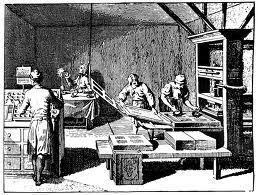 Notice the cabinet for upper case and lower case letters at the left.
Notice the cabinet for upper case and lower case letters at the left.***
For over six-hundred years, the mechanically printed word on paper has been the Holy Grail of written thought. The imprisonment of ideas in ink on the page made the modern world possible.
The ignorant masses were learning to read. Now, public opinion could be influenced and pamphleteering became the new avenue of political and religious thought. Radical ideas and heresies could be spread on an unprecedented rate. The ruling elite began to worry.
 Gutenberg Bible Illuminated Manuscript DetailIn some circles, the printing press was deemed an implement of the devil. But in a stroke of marketing genius, Gutenberg chose the Mazarin Bible in 1455 AD as the very first book printed and mass produced on his new invention, and the Church gave him its blessing.
Gutenberg Bible Illuminated Manuscript DetailIn some circles, the printing press was deemed an implement of the devil. But in a stroke of marketing genius, Gutenberg chose the Mazarin Bible in 1455 AD as the very first book printed and mass produced on his new invention, and the Church gave him its blessing.With the invention on the microprocessor in 1975, the personal computer made home computing a reality for millions of people in the 1980s. Countless advancements have been made since those early days.
The ability to reach out to the world rests literally in the palms of our hands. Movies, television, music, internet, email, shopping, the time and the weather are all at our finger tips twenty-four hours a day.
 The characteristic posture of a twenty-first century human seems to be a person hunched over a Smartphone peering into a two by four inch screen, tapping out a clipped message with his or her opposable thumbs.
The characteristic posture of a twenty-first century human seems to be a person hunched over a Smartphone peering into a two by four inch screen, tapping out a clipped message with his or her opposable thumbs. A popular view held by many people is that writing and reading aren't as valued in our visually attuned and post literate society as they once were. The culture of paper has given way to the digital world.
The paperless workplace is a corporate ideal and books may soon become relics if some people have their way. How close to Ray Bradbury's Fahrenheit 451 nightmare vision of a bookless world have we come as a culture?
True! Icons and symbols comprise many of the messages we interpret everyday, and they take us back to a pictographic level of clipped, symbolic expression. The very beginnings of written language were symbolic cave paintings. Today, we use apps on our personal electronics to help us navigate the net with the touch of a finger.
 Steve Jobs with i-Pad
Steve Jobs with i-PadMany people these days show their joy or grief with emoticons or simple abbreviations which have a whole lexicon and iconography of their own. The age of the love and the Dear John letter is all but a memory.
With today's electronic tablets and smart phones, virtually everyone has a window on the world in their hands. In many ways, as global communications improve, the world seems to get smaller. Whether that is a good or a bad thing is debatable.
The curious thing I notice about this brave new world of hand held computing is that it tends to isolate people socially. Many people are closer and more responsive to their virtual friends, than they are to the people around them.
And I myself feel drawn by the cold embrace of my computer if I'm away from it for any length of time. I know of a person who sleeps with her i-Phone next to her pillow. I kid you not!
Lately, I've noticed families or young people out to dinner at some restaurant, and everyone is engaged in text messaging, shopping, watching video, or gaming rather than interacting with each other.
I know this is anecdotal evidence, but have you noticed this too? If not, you may be drawn into the hypnotic stare of the one-eyed looking glass and be too self-absorbed to notice.
***
Enjoy this Academy Award winning animation on the wonder of books: The Fantastic Flying Books of Mr. Morris Lessmore:
http://vimeo.com/35404908
Published on July 05, 2013 00:00
July 1, 2013
Medical Marijuana and William F. Buckley's Take of the Death of Peter McWilliams
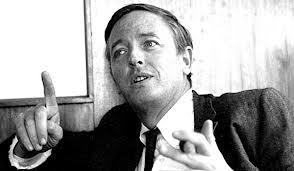 William F. Buckley On
William F. Buckley On The Death Of Peter McWilliams
By William F. Buckley 6-24-00 Peter McWilliams is dead. Age? Fifty. Profession? Author, poet, publisher. Particular focus of interest? A federal judge in California (George King) would decide in a few weeks how long a sentence to hand down, and whether to send McWilliams to prison or let him serve his sentence at home. What was his offense? He collaborated in growing marijuana plants. What was his defense? Well, the judge wouldn't allow him to plead his defense to the jury. If given a chance, the defense would have argued that under Proposition 215, passed into California constitutional law in 1996, infirm Californians who got medical relief from marijuana were permitted to use it. The judge also forbade any mention that McWilliams suffered from AIDS and cancer, and got relief from the marijuana.
 What was he doing when he died? Vomiting. The vomiting hit him while in his bathtub, and he choked to death. Was there nothing he might have done to still the impulse to vomit? Yes, he could have taken marijuana; but the judge's bail terms forbade him to do so, and he submitted to weekly urine tests to confirm that he was living up to the terms of his bail. Did anybody take note of the risk he was undergoing? He took Marinol -- a proffered, legal substitute, but reported after using it that it worked for him only about one-third of the time. When it didn't work, he vomited. Was there no public protest against the judge's ruling? Yes. On June 9, the television program 20/20 devoted a segment to the McWilliams plight. Commentator John Stossel summarized: "McWilliams is out of prison on the condition that he not smoke marijuana, but it was the marijuana that kept him from vomiting up his medication. I can understand that the federal drug police don't agree with what some states have decided to do about medical marijuana, but does that give them the right to just end-run those laws and lock people up?" Shortly after the trial last year, Charles Levendosky, writing in the Ventura County (Calif.) Star, summarized: "The cancer treatment resulted in complete remission." But only the marijuana gave him sustained relief from the vomiting that proved mortal. Is it being said, in plain language, that the judge's obstinacy resulted in killing McWilliams? Yes. A Libertarian Party press release has made exactly that charge. "McWilliams was prohibited from using medical marijuana -- and being denied access to the drug's anti-nausea properties almost certainly caused his death." Reflecting on the judge's refusal to let the jury know that there was understandable reason for McWilliams to believe he was acting legally, I ended a column in November by writing, "So, the fate of Peter McWilliams is in the hands of Judge King. Perhaps the cool thing for him to do is delay a ruling for a few months, and just let Peter McWilliams die." Well, that happened on June 14.
What was he doing when he died? Vomiting. The vomiting hit him while in his bathtub, and he choked to death. Was there nothing he might have done to still the impulse to vomit? Yes, he could have taken marijuana; but the judge's bail terms forbade him to do so, and he submitted to weekly urine tests to confirm that he was living up to the terms of his bail. Did anybody take note of the risk he was undergoing? He took Marinol -- a proffered, legal substitute, but reported after using it that it worked for him only about one-third of the time. When it didn't work, he vomited. Was there no public protest against the judge's ruling? Yes. On June 9, the television program 20/20 devoted a segment to the McWilliams plight. Commentator John Stossel summarized: "McWilliams is out of prison on the condition that he not smoke marijuana, but it was the marijuana that kept him from vomiting up his medication. I can understand that the federal drug police don't agree with what some states have decided to do about medical marijuana, but does that give them the right to just end-run those laws and lock people up?" Shortly after the trial last year, Charles Levendosky, writing in the Ventura County (Calif.) Star, summarized: "The cancer treatment resulted in complete remission." But only the marijuana gave him sustained relief from the vomiting that proved mortal. Is it being said, in plain language, that the judge's obstinacy resulted in killing McWilliams? Yes. A Libertarian Party press release has made exactly that charge. "McWilliams was prohibited from using medical marijuana -- and being denied access to the drug's anti-nausea properties almost certainly caused his death." Reflecting on the judge's refusal to let the jury know that there was understandable reason for McWilliams to believe he was acting legally, I ended a column in November by writing, "So, the fate of Peter McWilliams is in the hands of Judge King. Perhaps the cool thing for him to do is delay a ruling for a few months, and just let Peter McWilliams die." Well, that happened on June 14.
 The struggle against a fanatical imposition of federal laws on marijuana will continue, as also on the question whether federal laws can stifle state initiatives. Those who believe the marijuana laws are insanely misdirected have a martyr. Peter was a wry, mythogenic guy, humorous, affectionate, articulate, shrewd, sassy. He courted anarchy at the moral level. His most recent book (his final book) was called Ain't Nobody's Business If You Do. We were old friends, and I owe my early conversion to word processing to his guidebook on how to do it. Over the years we corresponded, and he would amiably twit my conservative opinions. When I judged him to have gone rampant on his own individualistic views in his book, I wrote him to that effect. I cherish his reply -- nice acerbic deference, the supreme put-down: "Please remember the Law of Relativity as applied to politics: In order for you to be right, at least someone else must be wrong. Your rightness is only shown in relation to the other's wrongness. Conversely, your rightness is necessary for people like me to look truly wrong. Before Bach, people said of bad organ music, `That's not quite right.' After Bach, people said flatly, `That's wrong.' This allowed dedicated composers to grow, and cast the neophytes back to writing how-to-be-happy music. So, thank me for my wrongness, as so many reviews of my book will doubtless say, `People should read more of a truly great political commentator: William F. Buckley Jr.' " Imagine such a spirit ending its life at 50, just because they wouldn't let him have a toke. We have to console ourselves with the comment of the two prosecutors. They said they were "saddened" by Peter McWilliams' death. Many of us are -- by his death...and by the causes of it.
The struggle against a fanatical imposition of federal laws on marijuana will continue, as also on the question whether federal laws can stifle state initiatives. Those who believe the marijuana laws are insanely misdirected have a martyr. Peter was a wry, mythogenic guy, humorous, affectionate, articulate, shrewd, sassy. He courted anarchy at the moral level. His most recent book (his final book) was called Ain't Nobody's Business If You Do. We were old friends, and I owe my early conversion to word processing to his guidebook on how to do it. Over the years we corresponded, and he would amiably twit my conservative opinions. When I judged him to have gone rampant on his own individualistic views in his book, I wrote him to that effect. I cherish his reply -- nice acerbic deference, the supreme put-down: "Please remember the Law of Relativity as applied to politics: In order for you to be right, at least someone else must be wrong. Your rightness is only shown in relation to the other's wrongness. Conversely, your rightness is necessary for people like me to look truly wrong. Before Bach, people said of bad organ music, `That's not quite right.' After Bach, people said flatly, `That's wrong.' This allowed dedicated composers to grow, and cast the neophytes back to writing how-to-be-happy music. So, thank me for my wrongness, as so many reviews of my book will doubtless say, `People should read more of a truly great political commentator: William F. Buckley Jr.' " Imagine such a spirit ending its life at 50, just because they wouldn't let him have a toke. We have to console ourselves with the comment of the two prosecutors. They said they were "saddened" by Peter McWilliams' death. Many of us are -- by his death...and by the causes of it.
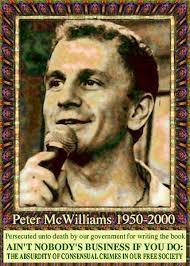 _____ Buckley is (was) a nationally syndicated columnist based in New York.
_____ Buckley is (was) a nationally syndicated columnist based in New York.
Published on July 01, 2013 00:00
June 26, 2013
Medical Marijuana and My Friend Peter McWilliams
Peter and I went to Allen Park High School together in the mid-1960's. He was a bright and precocious student but was considered by many to be a nerd. Like many nerds before or since, Peter was grossly underestimated by most of his high school peers. Peter came into his own during his college days at Eastern Michigan University and began a successful career as an author. The story of his death is emblematic of the senseless and inhumane war on marijuana waged by a misguided legal system. In his case, the law killed him.
 1950-2000 US: The Life and Death of Peter McWilliamsGet ActiveSubscribeSupport Us
1950-2000 US: The Life and Death of Peter McWilliamsGet ActiveSubscribeSupport Us




 URL: http://www.mapinc.org/drugnews/v00/n9...
URL: http://www.mapinc.org/drugnews/v00/n9...
Newshawk: MAP - Making A Difference With Your Help
Votes: 9
Pubdate: August 2000
Source: Liberty Magazine (US)
Copyright: 2000 Liberty Foundation
Contact: letterstoeditor@LibertySoft.com
Address: Box 1118, Port Townsend, WA 98368
Website: http://www.libertysoft.com/liberty/index.html
Author: R. W. Bradford
Referenced: http://www.mapinc.org/drugnews/v00/n000/a188.html
Bookmark: http://www.mapinc.org/mcwilliams.htm
THE LIFE AND DEATH OF PETER MCWILLIAMS
Another Casualty Of The War On Drugs
On June 14, Natalie Fisher went to Peter McWilliams' home, where she worked as housekeeper to the wheelchair-bound victim of AIDS and cancer. In the bathroom on the second floor, she found his life-less body. He had choked to death on his own vomit.
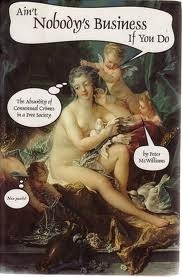 As regular readers of Liberty know, Peter, a world famous author* and a regular contributor to these pages, was diagnosed with AIDS and non-Hodgkins lymphoma in early 1996. Like many people stricken with AIDS or cancer, he had great difficulty keeping down the drugs that controlled or mitigated those afflictions. He began to smoke marijuana to control the drug-induced nausea. It saved his life: by early 1998, both his cancer and his AIDS were under control.
As regular readers of Liberty know, Peter, a world famous author* and a regular contributor to these pages, was diagnosed with AIDS and non-Hodgkins lymphoma in early 1996. Like many people stricken with AIDS or cancer, he had great difficulty keeping down the drugs that controlled or mitigated those afflictions. He began to smoke marijuana to control the drug-induced nausea. It saved his life: by early 1998, both his cancer and his AIDS were under control.
In 1996, California voters enacted a law legalizing the use of marijuana by people, like Peter, who needed it for medical reasons. Peter was an enthusiastic supporter of the new law, both because he believed in maximizing human liberty and because marijuana had saved his life and was, indeed, keeping him alive.
But Peter was more than an advocate. After the Clinton administration announced it would ignore the state law and continue to prosecute marijuana users who needed the drug to stay alive, it remained very difficult for others who needed medical marijuana to get the drug. So Peter helped finance the efforts of Todd McCormick to cultivate marijuana for distribution to those who needed it for medical reasons.
His articulate advocacy of legalizing medical marijuana brought him to the attention of federal authorities, who got wind of Todd McCormick's attempt to grow marijuana for medicinal purposes and of Peter's involvement with it. And it came to pass that in the early morning of December 17, 1997, federal agents invaded his home and business, and confiscated a wide array of his property
(including his computers, one of whose hard disks contained the book he was writing). In July 1998 they arrested him on charges of conspiring to grow marijuana.
His mother and brother put up their homes as bond and he was released from jail to await his trial. One of the conditions of his bail was that he smoke no marijuana. Unwilling to risk the homes of his mother and brother, he obeyed the order. His viral load, which had fallen to undetectable levels, now soared to dangerous levels:
"Unable to keep down the life-saving prescription medications, by November 1998, four months after my arrest, my viral load soared to more than 256,000. In 1996 when my viral load was only 12,500, I had already developed an AIDS-related cancer .... Even so, the government would not yield. It continued to urine test me. If marijuana were found in my system, my mother and brother would lose their homes and I would be returned to prison" said Peter.
Peter's health wasn't all that was ruined. Unable to work because of the disease and facing mounting legal bills, he was forced into bankruptcy. But he didn't give up: he experimented with various regimens and eventually managed to keep his medication down for as long as an hour and a quarter, long enough for some of the medication to work its way into his system. But the process had weakened him to the point where he was wheelchair-bound.
His publishing venture destroyed and his assets gone, Peter focused on his upcoming trial. He relished the chance to defend himself in court: medical marijuana was legal under state law and he believed a spirited defense could both exonerate him and help establish a legal fight to grow marijuana for medical purposes.
Last November, news came that would have crushed a lesser man: the judge in the case ruled that Peter could not present to the jury any information about his illness, the fact that the government's own research concludes that marijuana is virtually the only way to treat the illness, or that using marijuana for medical purposes was legal in California.
Unable to defend himself against the government's charges, Peter concluded that he had no choice but to plea bargain. He agreed to plead guilty, in hopes that any incarceration could be served under house arrest, since sending him to prison, where he would not be able to follow his lifesaving regimen, would be tantamount to sentencing him to death.
On June 11, there was a fire in his home, which destroyed the letters to the judge that he had acquired and the computer containing the book he was writing on his ordeal. Three days later, he died, apparently as a result of his inability to keep his medication down.
When I heard that Peter had died I was grief-stricken. I'd known him only for a couple of years, but that was more than enough for me to come to respect and love him. I became acquainted with him shortly after the drug police raided his home, the first in the series of calamities that befell him.
Three things about Peter were truly amazing.
Despite the government's persecution, which resulted in the loss of virtually all his property, his freedom, and ultimately his life, he never descended into hatred. Time and time again, he cautioned friends against falling victim to hate or giving in to the desire for revenge. "My enemy is ignorance," he'd say, "not individuals."
I was also astonished by his ability to focus on the future and not get depressed about the calamities that befell him. I spoke to him dozens, perhaps hundreds, of times during his ordeal, and I do not recall a single time when he even remotely sounded down or acted as if he were seeking my sympathy.
The third astonishing thing about Peter was his remarkable generosity of spirit. He always offered help and encouragement to others, no matter what his own circumstances were. A few months ago, I was contacted by a publisher with a request to reprint an article of Peter's that had appeared in Liberty. The publisher was one of the few who routinely is willing to pay for reprint rights, so I called Peter with the good news, and asked him how much he'd like me to ask for his article. "Nothing," he said. "I want to encourage people to reprint my writing on the drug war." I reiterated that this publisher happily paid $100 to $200 for reprint rights, that it was very prosperous and that he could use the money. (By this time, Peter was so broke that he was asking friends to use his website as a portal to various shopping websites so that he would receive the small commissions that they offer.) But Peter would have none of it. "We are in a war of ideas," he said. "And I want my writing to have the widest possible effect."
I must admit that when I learned the tragic news of Peter's death, my spirit was not so generous as his. I thought about the judge who had denied him his day in court and had ordered him to forgo the medication that kept him alive. I suppose he's happy, I said to myself, now that he's murdered Peter.
I'm one of those libertarians who generally tries to look at government policies more as folly than as evil. But sometimes, the evil that government does transcends simple folly. Sometimes I have to be reminded that there is a real human cost of government. It happened when I learned of the government's killing of 86 people at Waco and its murder of Vicki Weaver at Ruby Ridge. And it happened with Peter, too.
Peter never wanted to be a martyr. But he wanted to live in a free country, where people respected each others rights and choices, and he did what he thought was best to keep himself alive and to advance the cause of liberty. He was one of the most joyous people I've ever known, a hero in every sense of the word.
So rather than belabor his tragic death, Liberty will celebrate his life by publishing for the first time the full text of his address to the Libertarian Party National Convention in 1998. It's vintage Peter McWilliams: funny, wise, charming, intelligent, full of piss and vinegar.
I invite you to read and enjoy it -- and join with other people of good will in celebrating the life of this good, kind, decent, generous, and brilliant man.

* He wrote several best-sellers, including some of the first books about using microcomputers, "How to Survive the Loss of Love" ( which sold more than four million copies, several books of poetry ( with total sales of nearly four million ), and "Ain't Nobody's Business If You Do", a brilliant analysis of consensual "crimes." MAP posted-by: Doc-Hawk
See William F. Buckley's take on Peter's death in part two of this tragedy.
 1950-2000 US: The Life and Death of Peter McWilliamsGet ActiveSubscribeSupport Us
1950-2000 US: The Life and Death of Peter McWilliamsGet ActiveSubscribeSupport Us




 URL: http://www.mapinc.org/drugnews/v00/n9...
URL: http://www.mapinc.org/drugnews/v00/n9...Newshawk: MAP - Making A Difference With Your Help
Votes: 9
Pubdate: August 2000
Source: Liberty Magazine (US)
Copyright: 2000 Liberty Foundation
Contact: letterstoeditor@LibertySoft.com
Address: Box 1118, Port Townsend, WA 98368
Website: http://www.libertysoft.com/liberty/index.html
Author: R. W. Bradford
Referenced: http://www.mapinc.org/drugnews/v00/n000/a188.html
Bookmark: http://www.mapinc.org/mcwilliams.htm
THE LIFE AND DEATH OF PETER MCWILLIAMS
Another Casualty Of The War On Drugs
On June 14, Natalie Fisher went to Peter McWilliams' home, where she worked as housekeeper to the wheelchair-bound victim of AIDS and cancer. In the bathroom on the second floor, she found his life-less body. He had choked to death on his own vomit.
 As regular readers of Liberty know, Peter, a world famous author* and a regular contributor to these pages, was diagnosed with AIDS and non-Hodgkins lymphoma in early 1996. Like many people stricken with AIDS or cancer, he had great difficulty keeping down the drugs that controlled or mitigated those afflictions. He began to smoke marijuana to control the drug-induced nausea. It saved his life: by early 1998, both his cancer and his AIDS were under control.
As regular readers of Liberty know, Peter, a world famous author* and a regular contributor to these pages, was diagnosed with AIDS and non-Hodgkins lymphoma in early 1996. Like many people stricken with AIDS or cancer, he had great difficulty keeping down the drugs that controlled or mitigated those afflictions. He began to smoke marijuana to control the drug-induced nausea. It saved his life: by early 1998, both his cancer and his AIDS were under control. In 1996, California voters enacted a law legalizing the use of marijuana by people, like Peter, who needed it for medical reasons. Peter was an enthusiastic supporter of the new law, both because he believed in maximizing human liberty and because marijuana had saved his life and was, indeed, keeping him alive.
But Peter was more than an advocate. After the Clinton administration announced it would ignore the state law and continue to prosecute marijuana users who needed the drug to stay alive, it remained very difficult for others who needed medical marijuana to get the drug. So Peter helped finance the efforts of Todd McCormick to cultivate marijuana for distribution to those who needed it for medical reasons.
His articulate advocacy of legalizing medical marijuana brought him to the attention of federal authorities, who got wind of Todd McCormick's attempt to grow marijuana for medicinal purposes and of Peter's involvement with it. And it came to pass that in the early morning of December 17, 1997, federal agents invaded his home and business, and confiscated a wide array of his property
(including his computers, one of whose hard disks contained the book he was writing). In July 1998 they arrested him on charges of conspiring to grow marijuana.
His mother and brother put up their homes as bond and he was released from jail to await his trial. One of the conditions of his bail was that he smoke no marijuana. Unwilling to risk the homes of his mother and brother, he obeyed the order. His viral load, which had fallen to undetectable levels, now soared to dangerous levels:
"Unable to keep down the life-saving prescription medications, by November 1998, four months after my arrest, my viral load soared to more than 256,000. In 1996 when my viral load was only 12,500, I had already developed an AIDS-related cancer .... Even so, the government would not yield. It continued to urine test me. If marijuana were found in my system, my mother and brother would lose their homes and I would be returned to prison" said Peter.
Peter's health wasn't all that was ruined. Unable to work because of the disease and facing mounting legal bills, he was forced into bankruptcy. But he didn't give up: he experimented with various regimens and eventually managed to keep his medication down for as long as an hour and a quarter, long enough for some of the medication to work its way into his system. But the process had weakened him to the point where he was wheelchair-bound.
His publishing venture destroyed and his assets gone, Peter focused on his upcoming trial. He relished the chance to defend himself in court: medical marijuana was legal under state law and he believed a spirited defense could both exonerate him and help establish a legal fight to grow marijuana for medical purposes.
Last November, news came that would have crushed a lesser man: the judge in the case ruled that Peter could not present to the jury any information about his illness, the fact that the government's own research concludes that marijuana is virtually the only way to treat the illness, or that using marijuana for medical purposes was legal in California.
Unable to defend himself against the government's charges, Peter concluded that he had no choice but to plea bargain. He agreed to plead guilty, in hopes that any incarceration could be served under house arrest, since sending him to prison, where he would not be able to follow his lifesaving regimen, would be tantamount to sentencing him to death.
On June 11, there was a fire in his home, which destroyed the letters to the judge that he had acquired and the computer containing the book he was writing on his ordeal. Three days later, he died, apparently as a result of his inability to keep his medication down.
When I heard that Peter had died I was grief-stricken. I'd known him only for a couple of years, but that was more than enough for me to come to respect and love him. I became acquainted with him shortly after the drug police raided his home, the first in the series of calamities that befell him.
Three things about Peter were truly amazing.
Despite the government's persecution, which resulted in the loss of virtually all his property, his freedom, and ultimately his life, he never descended into hatred. Time and time again, he cautioned friends against falling victim to hate or giving in to the desire for revenge. "My enemy is ignorance," he'd say, "not individuals."
I was also astonished by his ability to focus on the future and not get depressed about the calamities that befell him. I spoke to him dozens, perhaps hundreds, of times during his ordeal, and I do not recall a single time when he even remotely sounded down or acted as if he were seeking my sympathy.
The third astonishing thing about Peter was his remarkable generosity of spirit. He always offered help and encouragement to others, no matter what his own circumstances were. A few months ago, I was contacted by a publisher with a request to reprint an article of Peter's that had appeared in Liberty. The publisher was one of the few who routinely is willing to pay for reprint rights, so I called Peter with the good news, and asked him how much he'd like me to ask for his article. "Nothing," he said. "I want to encourage people to reprint my writing on the drug war." I reiterated that this publisher happily paid $100 to $200 for reprint rights, that it was very prosperous and that he could use the money. (By this time, Peter was so broke that he was asking friends to use his website as a portal to various shopping websites so that he would receive the small commissions that they offer.) But Peter would have none of it. "We are in a war of ideas," he said. "And I want my writing to have the widest possible effect."
I must admit that when I learned the tragic news of Peter's death, my spirit was not so generous as his. I thought about the judge who had denied him his day in court and had ordered him to forgo the medication that kept him alive. I suppose he's happy, I said to myself, now that he's murdered Peter.
I'm one of those libertarians who generally tries to look at government policies more as folly than as evil. But sometimes, the evil that government does transcends simple folly. Sometimes I have to be reminded that there is a real human cost of government. It happened when I learned of the government's killing of 86 people at Waco and its murder of Vicki Weaver at Ruby Ridge. And it happened with Peter, too.
Peter never wanted to be a martyr. But he wanted to live in a free country, where people respected each others rights and choices, and he did what he thought was best to keep himself alive and to advance the cause of liberty. He was one of the most joyous people I've ever known, a hero in every sense of the word.
So rather than belabor his tragic death, Liberty will celebrate his life by publishing for the first time the full text of his address to the Libertarian Party National Convention in 1998. It's vintage Peter McWilliams: funny, wise, charming, intelligent, full of piss and vinegar.
I invite you to read and enjoy it -- and join with other people of good will in celebrating the life of this good, kind, decent, generous, and brilliant man.

* He wrote several best-sellers, including some of the first books about using microcomputers, "How to Survive the Loss of Love" ( which sold more than four million copies, several books of poetry ( with total sales of nearly four million ), and "Ain't Nobody's Business If You Do", a brilliant analysis of consensual "crimes." MAP posted-by: Doc-Hawk
See William F. Buckley's take on Peter's death in part two of this tragedy.
Published on June 26, 2013 00:00
June 18, 2013
John Norman Collins Supporters on Kelly & Company - Monday, October 3, 1988
 On Friday, October 1, 1988, Marilyn Turner conducted a videotaped interview with convicted "coed killer" John Norman Collins. Clips from that interview were interspersed among the live portions of the popular Detroit morning talk show, Kelly & Company, on the following Monday.
On Friday, October 1, 1988, Marilyn Turner conducted a videotaped interview with convicted "coed killer" John Norman Collins. Clips from that interview were interspersed among the live portions of the popular Detroit morning talk show, Kelly & Company, on the following Monday.This interview is the only footage of Collins I have been able to find, except for a couple of perp walks in and out of court.
 Part four of the interview was reserved for the supporters of John Collins who gave their assessment of his innocence. First was Marlene Thompson, ordained minister in the International and National Universal Life Church of Love. She had been Collins "spiritual adviser" for almost four years. Her view was that he was a caring and intellectual person who "shows great concern for women and couldn't kill anything."
Part four of the interview was reserved for the supporters of John Collins who gave their assessment of his innocence. First was Marlene Thompson, ordained minister in the International and National Universal Life Church of Love. She had been Collins "spiritual adviser" for almost four years. Her view was that he was a caring and intellectual person who "shows great concern for women and couldn't kill anything." The other Collins' supporter on the panel was a reporter for the Oakland Press, Jackie Kallen, who had been writing Collins in jail and later in prison, since 1969 when he was arrested.
Ms. Kallen had some "mutual friends" with the Collins family. She opined that he may have been "railroaded" into prison. Her fervent belief was that "Collins is open and tells the truth as he perceives it. Maybe he doesn't know what he did."
The most remarkable and probing part of the whole show was when Marilyn Turner asked John Collins, in a calm soothing voice, "Did you love your mother, John?"
 With that one well-placed, personal question, she was able to penetrate his self-protective stratagems and catch him in an unguarded moment. Until that time, he asserted his control over the interview, then he lost control of his emotions and seemed disoriented from that point on.
With that one well-placed, personal question, she was able to penetrate his self-protective stratagems and catch him in an unguarded moment. Until that time, he asserted his control over the interview, then he lost control of his emotions and seemed disoriented from that point on.There is a wise saying that applies here, "Never play a player." Marilyn Turner did a great job interviewing a difficult subject.
http://www.youtube.com/watch?v=30SAljur34Q
Published on June 18, 2013 07:01
June 11, 2013
Dame Fortune Winks - I Smile Back
 All in a day's work at Zug Island.
All in a day's work at Zug Island.I had just dropped into Detroit for the day to do a segment on Zug Island with Joe Rogan for his new show, Question Everything, premiering July 16th on the Syfy Network.
Immediately afterwards, I headed south down deserted W. Jefferson towards Downriver but decided to stop at the Zug Island sign and take a picture for a blog post on my trip while I was there.
I swung my rental car into a small parking lot across the street between some abandoned Delray ruins and pointed the nose of the Japanese car towards the driveway.
Why I felt I needed another photo of the sign isn't clear to me, but I snapped a quick one and returned to my car, shut the door, and turned the key. In that small amount of time, a large car came out of nowhere and straddled my only escape route, a weed ravished driveway.
My first thought was "Oh, shit! Welcome to Detroit."
The power window on the passenger side of the full size car went down and a white guy with a fancy camera said, "I see we are doing the same thing."
Not wanting to feel trapped, I got out of my car and engaged the person in a conversation. "What's your interest in Zug Island?" I asked as if it were any of my business.
 Blast furnace being tapped at night."I'm making a documentary film about the environmental effects of Zug Island on the area."
Blast furnace being tapped at night."I'm making a documentary film about the environmental effects of Zug Island on the area.""Fascinating," I replied.
"What's your interest in the sign?" he asked.
I told him I wrote a book called Zug Island:A Detroit Riot Novel. "I'm..."
"I know who you are. I saw your book on the Zug Island website, and I've read some of your blog posts."
With that ice-breaker, we shook hands.
"Would you be interested in doing a few segments about Zug Island for the indie film I'm making?"
"Do steelworkers have dirt under their fingernails? Sure," I said. "But I don't live in the Detroit area anymore, I'm leaving at the crack of dawn tomorrow."
We both looked disappointed. Then I was quick to add, "I'll be back in town in a few weeks doing research on my current project, The Rainy Day Murders, about John Norman Collins and the coed killings of 1967-1969 in Ypsilanti and Ann Arbor."
"That works for me," he said. We exchanged contact information, and I waited a couple of days for a gmail with more information.
What this young filmmaker wants me to do is give a short biography of Samuel Zug at Zug's grave site and then do a couple of other segments about my experiences working on the island in 1967. Sounds easy enough.
Back then, the area was little more than a slum; now it is a ghost town, another casualty of rust belt technology impatient for redevelopment.
When completed, this film will be submitted to indie film festivals. Then, the producers hope to secure theatrical distribution and/or seek television broadcast opportunities. Whatever the outcome, it's a great experience for me that I couldn't miss.
I'm not one to believe in luck or fate, but if I'd been one minute sooner or later taking a picture of that sign, and if I hadn't been doing an interview with Joe Rogan that very morning on another project, I would have missed out on this opportunity.
I think I'll put this experience down as dumb luck and follow Dame Fortune like a damned fool.

Published on June 11, 2013 17:46
June 8, 2013
Is Zug Island Guilty of the Windsor Hum?
 Joe Rogan and I upwind of Zug IslandLast week, I spent two days in scenic Detroit amidst the ruins of the ghost town of Delray and an icon of the rust belt, the industrial complex known as Zug Island.
Joe Rogan and I upwind of Zug IslandLast week, I spent two days in scenic Detroit amidst the ruins of the ghost town of Delray and an icon of the rust belt, the industrial complex known as Zug Island.I was there taping a segment for a new Syfy Network show called Question Everything hosted by Joe Rogan. It debuts on Tuesday, July 16th at 9/8c. See the link below for more details.
Joe is looking into the theory that the Windsor Hum keeping Canadian residents awake at night emanates from United States Steel's Zug Island blast furnace, pig iron operation across the Detroit River.
One theory has it that the annoying sound and vibration is coming from a secret installation on the island, connected somehow with the High Frequency Active Auroral Research Program (HAARP) in Alaska.
Work began on that sub-arctic government project in 1993. An array of high powered radio frequency transmitters covering an area of thirty-six acres excites a targeted portion of the ionosphere for scientific and military applications. What those applications are is not clear to the public which makes this program popular among conspiracy theorists.
The project is located in Gakona, Alaska, and it is funded by the United States Air Force, the United States Navy, the University of Alaska, and the Defense Department. Its remote location contributes to the mystique of the project.
 Zug Island is on the United States/Canadian border and is considered by Homeland Security as a border installation, so security has been increased.
Zug Island is on the United States/Canadian border and is considered by Homeland Security as a border installation, so security has been increased. While we were shooting my interview, a black SUV with heavily tinted windows watched our every move. The co-producer told me that the mystery truck had been following them at a distance for two days.
Because United States Steel refuses to comment on the HAARP allegations, it begs the question for many people, "What are they trying to hide?". For my money, the Windsor Hum controversy cuts a sorry figure as a conspiracy theory. It doesn't even make a credible urban legend.
Now, what the government might be doing in the cavernous international Detroit Salt Mine, which runs far and wide under the area, is anybody's guess.

http://www.mmatko.com/joe-rogan-talks-about-his-new-syfy-show-joe-rogan-questions-everything/
Published on June 08, 2013 07:12
June 5, 2013
John Norman Collins Canadian Prison Gambit Exposed

Acting on his own behalf, John Norman Chapman applied for and received the necessary transfer documents from the Canadian Consulate and applied for his Canadian prison transfer.
On August 7, 1981, the Marquette Prison warden, T.H. Koehler, wrote the Deputy Director of the Michigan Department of Corrections Robert Brown, Jr. saying that he had "checked the qualifications for transfer to foreign countries and believe that this resident (John Norman Chapman) meets the necessary qualifications at this time."
The warden must have felt relieved that he was getting rid of a hot potato. He was quoted as saying that Collins was the only prisoner in his lockup who had a book written about him that's for sale in the prison store.
After approval by the Marquette Prison Classification Committee, newly christened Prisoner Chapman was transported to Jackson Prison by prison shuttle on Tuesday, December 29, 1981, to await a verification hearing on his transfer to be held on January 11, 1982, at the United States District Court in Detroit.
Attorney Miriam Seifer was appointed by the court to represent John Chapman at a Canadian transfer hearing. She was an undergraduate at the University of Michigan in Ann Arbor when John Collins was originally arrested in 1969. How odd that must have been for her.
Much to John Chapman's dismay, Ottawa (i.e. the Canadian government) had not completed the formal paperwork for the January 29th scheduled transfer date, so the hearing was postponed. John Norman Chapman was only one signature away from being transferred to a Canadian Prison, but he was so close, he could wait a little longer. Time was on his side now.
Meanwhile, on the morning of January 14, 1982, a letter addressed the Detroit Free Press city desk editor - William Hart - landed on his desk. It was from a prison inmate who had written to him before about prison reform.
 Although all the information contained in the letter was not strictly accurate, the information did get the desk editor's attention.
Although all the information contained in the letter was not strictly accurate, the information did get the desk editor's attention. It said that Collins had been released to Canadian authorities two weeks before (Collins was actually waiting in Jackson Prison), Collins planned to use a different name once in Canada, and he would be eligible for parole in two years with time served.
The prison informant added that this happened "with dollars being spread in the right areas." The letter ended with, "I would normally not pass information like this out, but if he's guilty of butchering young girls, then he's not the safest kind of a dude to be put where he could repeat."
Detroit Free Press editor Hart assigned reporter Marianne Rzepka to investigate the story. She found and interviewed Miriam Seifer, the court appointed attorney handling the case. That evening, Rzepka's story "Transfer to Canada for Killer" was the front page headline.
A Detroit Associated Press reporter picked up several early copies of the paper and returned quickly to his office. The story was immediately sent out on their news wire service to thirty-three newspapers and eighty-five radio and television stations across Michigan. By Friday, January 15, the story was reported throughout every corner of the state.
When the parents of slain Karen Sue Beineman read the story, they called William Delhey, Washtenaw County chief prosecutor for the Collins' case, and they went on their own media blitz.
Less than a week after Marianne Rzepka's article appeared, Michigan Department of Corrections Deputy Director, Robert Brown, Jr., revoked approval of the Collins' transfer.
In a letter dated January 20, 1982, Brown denied the transfer on the grounds that John was raised primarily in the United States and had minimal contact with Canadian relatives. It was with regret that he had to inform Chapman that "I am revoking our consideration of your request. I am sorry I could not give you are more favorable reply. Sincerely, MDOC."
When Mrs. Loretta Collins heard that her son's transfer had been rescinded, she told the press, "It's politics, dirty politics. John's hopes were raised; he was moved. Then, they slammed the door in his face. It's inhuman." Many Michigan mothers would disagree.
 John Norman Collins took a toss of the dice and they came up snake eyes. Every craps player knows what that means. Instant loser!
John Norman Collins took a toss of the dice and they came up snake eyes. Every craps player knows what that means. Instant loser!
Published on June 05, 2013 09:14
June 1, 2013
John Norman Collins and the Canadian Prison Gambit - Part One
 International Ambassador Bridge between Detroit and Windsor.
International Ambassador Bridge between Detroit and Windsor.On June 10, 1980, Michigan governor William Milliken signed an agreement (HR4308) with neighboring Canada to exchange prisoners to serve out the completion of their sentences in their home countries. The act joined the State of Michigan to the terms of a 1978 United States/Canadian treaty.
After exhausting all appeals for a new trial, John Norman Collins became aware of the international prisoner exchange treaty. Collins was born in Windsor, Ontario, Canada.
Collins' mother, Loretta, divorced for a second time by the time John was four, returned to her parents' home in Center Line, Michigan, with her three children in tow.
John became a naturalized American citizen at five years old. Now serving time in prison, he believed he held dual citizenship.
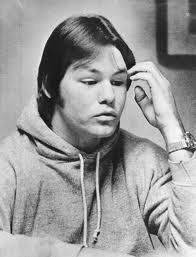 John Collins in Jackson Prison InterviewOn November 10, 1980, one month after Governor Milliken signed the international prisoner exchange agreement, Collins quietly applied to have his surname changed back to his Canadian birth father's name, Chapman.
John Collins in Jackson Prison InterviewOn November 10, 1980, one month after Governor Milliken signed the international prisoner exchange agreement, Collins quietly applied to have his surname changed back to his Canadian birth father's name, Chapman. The name change was granted January 5, 1981, and certified by the Deputy Registrar of Probate Court for the County of Macomb.
Mr. Richard Chapman lived in Kitchener, Ontario. Chapman had been estranged from his children at Loretta's insistence, but once John was charged with Karen Sue Beineman's murder, Mr. Chapman began to correspond and reconnect with his son.
John Collins certainly thought that he might be able to fly under the prison radar as Chapman and begin the process for a prisoner exchange under the international treaty.
In Michigan with no possibility for parole, Collins had to serve a minimum of twenty years before he could be considered for a pardon by a sitting Michigan governor. The chances of that happening were slim and none.
In Canada, an inmate serving a life sentence is eligible for parole after fifteen years. With time served in the Washtenaw County jail and various Michigan prisons, Collins could have been eligible for parole in 1985.
Part Two: John Norman Collins Canadian Prisoner Exchange Exposed
Published on June 01, 2013 20:29



